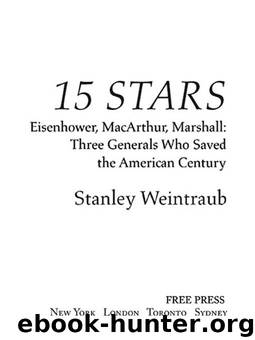15 Stars by Stanley Weintraub

Author:Stanley Weintraub
Language: eng
Format: epub
Publisher: free Press
Published: 2007-07-15T00:00:00+00:00
Returning to Washington, Marshall found more pleasant news. “A solid hold on Leyte,” he cabled Patton, “with minimum losses to date. Now if we can open up the port of Antwerp,” he wrote overconfidently, “the European picture will change rapidly.” Still, he warned Eisenhower again about banking wholly on “the Antwerp basket.” SHAEF, he said, needed two contingency plans: an “all-out effort to crush German resistance” by the beginning of the new year and strategy “for carrying on the battle beyond 1 January” if the Germans hung in. Aided by missed opportunities, the Germans would interfere with both alternatives.
On the same date that MacArthur’s forces seized footholds on Leyte, Eisenhower had reported to Washington that his shortage of artillery ammunition was “not merely one of port capacity and distributional facilities; it likewise involves limitations in production.” War matériel shortages were the fruits of apparent success. With seemingly imminent victory, factory workers had begun abandoning war employment for industries already retooling for civilian needs, or otherwise protecting former jobs before the influx of returned veterans. Strikes over salary caps escalated and shut down production lines. To keep troops from merely watching the war not get won, supplies shipped directly to French ports were offloaded onto quartermaster “Red Ball Express” long-haul trucks which roared with lights on through the darkness on highways cleared of all other traffic. Yet there was never enough.
Manpower crises had also increased with higher casualties in the push toward the Rhine. As the enemy backed toward the Heimat, resistance intensified. Reports that the Germans were drained of reserves fed press optimism about imminent victory, but Eisenhower, too, needed fresh troops. The British were cannibalizing from existing divisions. Marshall offered infantry replacements from the States dispatched, without waiting for additional shipping needed for their equipment and rotating them into action to rest and refit exhausted units.
As Eisenhower learned, “instead of replacing tired troops with fresh ones,” obtuse army commanders he did not identify (but protected) “assign[ed] a special sector to the new troops.” The exhausted units remained, and “the requirements of the front allowed us to do nothing else.” Brooke on October 26 mocked Marshall’s hope for a decision by Christmas as “wonderful.” The British chiefs of staff estimated that the earliest date for an end of the war with Germany was January 31, 1945, and the latest was mid-May. Japan might last into 1946.
Download
This site does not store any files on its server. We only index and link to content provided by other sites. Please contact the content providers to delete copyright contents if any and email us, we'll remove relevant links or contents immediately.
| Afghan & Iraq Wars | American Civil War |
| American Revolution | Vietnam War |
| World War I | World War II |
Waking Up in Heaven: A True Story of Brokenness, Heaven, and Life Again by McVea Crystal & Tresniowski Alex(37810)
Empire of the Sikhs by Patwant Singh(23086)
We're Going to Need More Wine by Gabrielle Union(19046)
Hans Sturm: A Soldier's Odyssey on the Eastern Front by Gordon Williamson(18591)
Leonardo da Vinci by Walter Isaacson(13336)
The Radium Girls by Kate Moore(12028)
Tools of Titans by Timothy Ferriss(8395)
Educated by Tara Westover(8054)
How to Be a Bawse: A Guide to Conquering Life by Lilly Singh(7486)
Permanent Record by Edward Snowden(5847)
The Last Black Unicorn by Tiffany Haddish(5635)
The Rise and Fall of Senator Joe McCarthy by James Cross Giblin(5280)
Promise Me, Dad by Joe Biden(5153)
The Wind in My Hair by Masih Alinejad(5095)
A Higher Loyalty: Truth, Lies, and Leadership by James Comey(4964)
The Crown by Robert Lacey(4817)
The Iron Duke by The Iron Duke(4356)
Joan of Arc by Mary Gordon(4110)
Stalin by Stephen Kotkin(3965)
